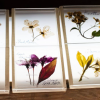
New art residencies will help people discover riverside parks
Two artists are creating opportunities for people to explore, reflect on and shape the future of Exeter’s green spaces.
The artwork is part of an overall plan to improve the Riverside Valley Park, which is loved by visitors and residents of Exeter alike.
Exeter City Council, which owns the land, has identified ways to improve the Park, set out in the Riverside and Ludwell Valley Park Masterplan. Suggestions include more opportunities for adventurous play, new orchards and flower-rich meadows.
Environmental artist, Anne-Marie Culhane’s project ‘FLOW’ will work with members of the local community to create a bountiful and biodiverse 4 km fruit and nut route along the River Exe between Exwick Mill and the Double Locks. Landscape artist Tania Kovats’ work ‘EXE – Living with the River’ explores the history of flooding and will be shared in a free newspaper this autumn.
The projects are curated by Ginkgo Projects and managed by Simon Bates, Green Infrastructure Project Manager at the Exeter and East Devon Growth Point.
Simon said: “Artists are skilled creative thinkers and open our eyes to new possibilities. The proposals for the Riverside & Ludwell Valley Park are ambitious and will need strong support and sustained action by the community, public, private and charitable sectors.
“These artistic residencies create an opportunity for the community to explore the distinctiveness of this common land, and influence the way in which it is used and managed now, and far into the future.”
‘FLOW’ began in June with local people walking along the river looking at land for tree planting, and suggesting ideas for the project. In ‘Running with Trees’ (13th September, 6.30 pm, The Malt House), Anne-Marie invites anyone to join her on a 3.5 km run, with stops, reflecting on our relationships to trees and their huge contribution to the global climate.
On 2 and 3 September at St Thomas Festival, in collaboration with artist Amy Shelton, Anne-Marie will create ‘Orchard Box’, a magical store of artefacts and memorabilia connected with fruit orchards and pollinators, and local people will be invited to share their own stories and ideas.
In the winter, the community will be invited to plant a tree and celebrate the new route together at ‘Rootstock’.
Tania’s research for ‘EXE’ puts the current flood defence scheme in context of the city’s history. The river connects Exeter deep into the county of Devon towards its source at Simonsbath in Exmoor, and out beyond to the rest of the world via the estuary at Exmouth.
Flooding is a devastating event that leaves physical and psychological scarring, and challenges our infrastructure and how we live. As floodwater subsides the memory of these events gets buried. But future weather extremes probably mean that we need new approaches to living with the river.
Exeter City Council’s Lead Councillor for Economy and Culture, Cllr Rachel Sutton said: “We want everyone to have the chance to be inspirational and creative, because it makes us feel better and more connected to others and our wonderful city. With the flood defence scheme in full swing, Anne-Marie’s commission invites the public to influence the landscaping, plant local varieties of fruit and nut tree this winter, and imagine an ‘Orchard City’.
“Tania’s commission brings the history of flooding back into people’s consciousness as a powerful symbol of what we cannot fully control.”
Funding totalling £45,000 for the project has been secured by the Exeter and East Devon Growth Point, with £5,000 from Exeter City Council, £27,000 from Arts Council England and £13,000 from private company Eagle Land. Full details of public events will be detailed in the autumn edition of ‘The Exeter Citizen’.
In the meantime, to stay informed about future events, please ‘like’ the Facebook page where details will be posted when they become available: www.facebook.com/ExeterValleyParks














